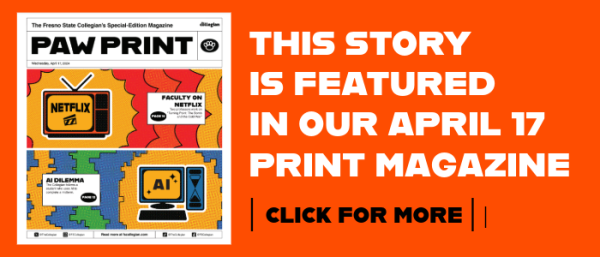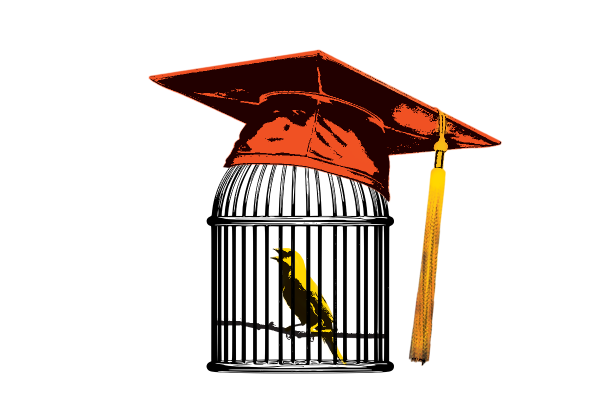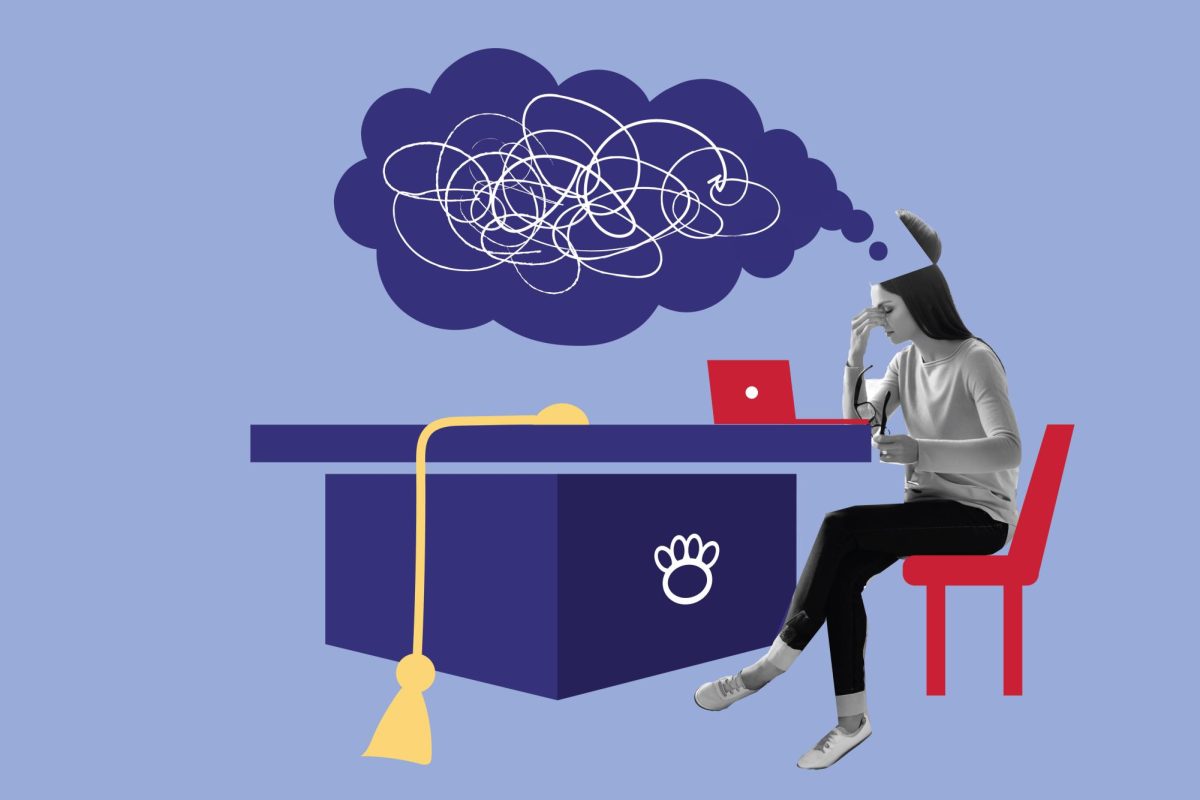The moment we’ve all been waiting for is here: graduation. Most of us have probably only ever known a life in education, attending school for 16 years from kindergarten to undergraduate.
I’ve always been told to study hard, get a degree and get a stable job, but what’s after that?
Has anyone ever really told you or prepared you for what’s after college?
To be quite honest, I’m not all that thrilled about graduation being only five weeks away. My first two years of college were impacted by the COVID-19 pandemic, forcing me to attend classes online. Now, post-graduate friends of mine have warned me about the potential loneliness you face once you graduate, which no one talks about.
“‘Post-graduation depression’ describes depressive symptoms that occur after a person finishes college or university,” reported Medical News Today. “Although it is not a medically recognized term, it is an experience many young adults may relate to.”
I know you’re probably thinking, “Great. Another thing to worry about,” which is what I’m also thinking. But maybe there’s hope and that’s why it’s worth talking about.
There are a few things that could lead to post-graduate depression.
Dr. Lotes Nelson, a clinical mental health counselor at Southern New Hampshire University, said maintaining relationships after graduating, difficulties adapting to mainstream life, the overall shift of mindset from student to a working adult and transitions involving changes to students’ daily living arrangements or routines can affect mental health after graduating.
The rate of depression in young adults ages 18-25 years old has doubled compared to the general population over the past decade, according to the Substance Abuse and Mental Health Services Administration.
Gurleen Kaur, a Fresno State criminology alumna, said she was mainly concerned about finding a career after graduation because she didn’t have a plan.
“It was different having so much time on my hands, but my part-time job did help with the adjustment, allowing me to still be part of a different type of community,” Kaur said. “I only spent roughly five months after college before being hired with a job that has started my career.”
Kaur said she had difficulty transitioning from being around students like her to the “adult world full of strangers.”
“I wish I was more prepared for certain parts of adulthood that [are] not discussed as often in school such as taxes, loans and how to do certain things,” she said. “I wish I was more prepared for the transition of always having homework, classes and assignments to minimal work.”
Jennifer Velazco, a Fresno State psychology alumna, shared the same sentiment as Kaur that adjusting to life after college was difficult for her. Her dream job was to become a tier II intervention specialist, working with children with disabilities. To do that she felt the need to quit her previous job of four years to allow her to grow.
“I did feel lonely after graduation and honestly, I missed saying I was a Fresno State student,” Velazco said. “I think I just wasn’t used to the change and I missed going to class and studying at the library.”
Velazco said the thing she was most unaware of after college was that just because you have a degree doesn’t mean you will have a job secured.
“Many of the people I knew who had the jobs I wanted either had a connection with the staff or had worked there for previous years beforehand,” she said. “I wish I would have known to make connections with people from different places, so I had a wide variety of options to choose from.”
Sarahy Valencia is preparing to graduate from Fresno State with a degree in psychology this spring. Her thoughts currently consist of maintaining organization and completing all the things she needs to do for the day of commencement.
Valencia said during her time at Fresno State she has been able to rely on the Educational Opportunity Program office, her academic advisor and professors for helpful information or support.
“The most important factor I have gotten used to in college that I might not be prepared to be without is having a question and not having the same access to asking an academic advisor, professor and services for a similar experience,” she told The Collegian.
A lot of what these students mentioned can streamline into isolation and mental health struggles.
I believe Fresno State does a phenomenal job at teaching students learning experiences in their specializations, but what’s lacking is the guidance to propel students to the next level after they leave the nest.

Here are a few ways to bridge the gap between graduation and adulting:
Lean into the alumni association
The Fresno State Alumni Association offers a multitude of resources to graduates that can help them stay connected with a network or aid in finding career opportunities.
Jacquelyn Glasener, executive director of the alumni association, said the Bulldog Alumni Network provides help with upskilling and has an exclusive job board for alumni seeking job opportunities or alumni looking for employees.
In addition, she said there are alumni chapters, clubs and networks that aid alumni in leadership skills and relationship building. These programs are volunteer-led and offer events, networking, service projects, fundraisers to support scholarships and student needs along with other activities as a way to foster community for alumni.
“We have a wide range of events to connect with and engage alumni,” Glasener said. “From our signature alumni events like Homecoming Week, Red Wave Tailgates, GradFest, Vintage Days and the Top Dog Alumni Awards, to various events happening across campus such as talks, lectures, networking and continuing educational opportunities and more.”
Glasener said a lot of alumni are unaware that they can update their contact information to learn about volunteer opportunities, submit a class note to let the association know about their personal or professional achievements and sign up to receive alumni e-newsletters.
Make connections, no matter how small
Jesús Cano, a Fresno State journalism alumni, said he was working two jobs after graduating to make ends meet while trying to pursue a career in journalism.
He was working part-time as a remote sports editorial clerk for The San Jose Mercury News and as a maintenance technician for his apartment complex. He said it was hard to transition into a new routine after college, but because he was living in Fresno, he was able to rely on friends and family until he had to move for a career opportunity.
“I think the biggest challenge for me was when I went from The Mercury News to MLB.com because I went from Fresno to Phoenix, Arizona,” Cano said. “It got really tough because I don’t know anybody in Phoenix. I don’t know anybody around me. It’s a whole different city. It’s a whole different state.”
Cano said it was difficult to adjust to living in Phoenix after having to leave his family, friends and girlfriend behind and having to learn how to do certain things on his own. He said he would sometimes be home at his new apartment for two weeks at a time and began taking up hobbies like watching more TV, movies and professional wrestling.
A lot of post-graduate loneliness can stem from the lack of “third spaces,” spaces that aren’t home or work.
Renee Yaseen reported on The Washington Post that when you’re out in the “real world” you have to make the first move to extinguish loneliness. Yaseen said a compassionate community can be built by making it a habit to speak to strangers in public.
The developmental psychologist Yaseen interviewed gave an example of this by suggesting that when you’re at a grocery store, ask the clerk how they are or how things are going because speaking, laughing and making eye contact help everyone through “mini connections.”
“Revealing a desire to be friends with someone, or hinting that you need company, might feel embarrassing or vulnerable,” Yaseen said. “But if you’re strong enough to endure loneliness, you’re strong enough to endure a ‘no thanks’ from the person standing next to you at the dog park.”
Find well-being tactics that work for you
Once you graduate Fresno State, you can no longer utilize the Student Health and Counseling Center for medical or counseling needs. That means you need to find well-being resources or methods that work for you.
“We will ensure that students are appropriately ‘transitioned’ to medical or counseling care and will help them with a referral in the community for ongoing care,” said Janell Morillo, associate vice president for student health, counseling and wellness.
However, if students had a counselor during their time at Fresno State, there is a multi-step process that begins 8-10 weeks before the end of their final semester to get students connected with resources after college.
“We work together to ensure that the students have health insurance or have applied for health insurance with the support of the case manager at the Center for Essential Needs,” said Etisha Wilbon, director of counseling and psychological services. “Once connected, we begin to process transition and support by getting them connected with outside counselors through referrals to resources in their desired communities.”
Basic needs like food can sometimes be one of the most overwhelming concerns affecting your daily life, causing extra stress. Try starting with small, simple goals to rewire your brain so that you can make changes to your life.
Build up these small wins into healthy habits that will benefit you in the long run. For example, eat nutritious food, get enough rest and exercise.
I feel reassured knowing that I’m not the only one concerned about finding a career, staying in touch and taking care of myself after college. If you’re feeling the same way, all of those things are normal and you’re not alone.
After graduation, it can become so easy to compare yourself to peers and forget about your well-being. You are worthy of that bachelor’s degree you’ve earned and even more worthy of finding happiness after college.




